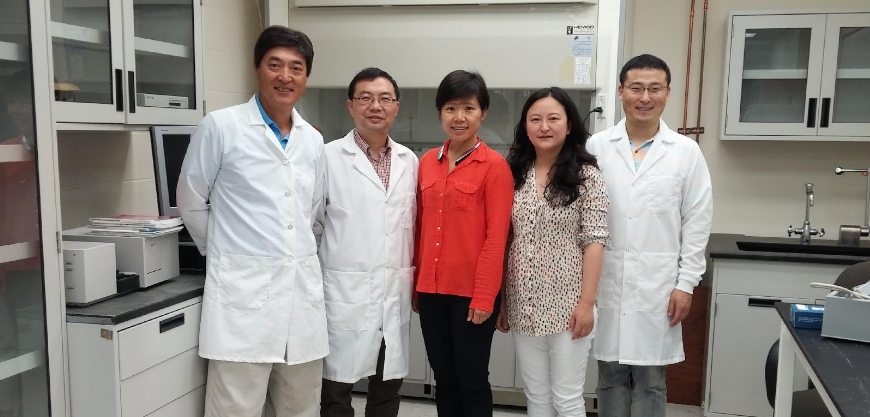
ZY Therapeutics: Building a Better Cancer Drug in RTP
Though the Research Triangle Park has historically been associated with sprawling campuses and big biotech names, its central location and thriving startup community continue to inspire innovation on every scale. For evidence of that, look no further than ZY Therapeutics, a company developing groundbreaking nanoparticle drug delivery systems right here in The Lab at RTP.
CEO and co-founder Jian Bao, who is originally from China, came to the United States in 1996 to begin a graduate program in chemistry. After completing her doctorate in 2001, she went on to work in pharmaceuticals for the next 15 years. Jian’s career led her to work with specialty chemicals on gene repair technologies designed to treat problems like birth defects and cancer. She quickly realized how effective treatments could be if they were able to directly target and repair DNA.
“That was when I first saw that commercialized delivery for cancer treatments and other drugs could be a viable entity,” she says.“In many cases, the drugs are out there, they’re just not being delivered to the right place and in the most efficient way.” Therapeutics launched in 2012 with a team of two: Jian and co-founder Dr. Jun Li, who now serves as Chief Scientific Officer. “Dr. Li and I worked together in the pharmaceutical industry for a long time,” she says. “When I told him my idea, he said, ‘if you’re starting your own shop, I’m coming too.’” That vote of confidence was the first of many she would receive over the next five years as she set out to improve upon the oncology treatment status quo.
In the beginning, Jian was using her own savings to get the project off the ground, relying on the support of her family to stretch the hours in each day. Though she had faith in the technology, funding can be hard to come by even in later stages of development, so things went slowly to start. Then, when a windfall bonus from her husband’s job enabled them to lease space and expand the team, ZY’s mission began to unfold: make life-saving drugs safer, more effective, and more affordable.
“In today’s world, people get sick,” says Jian. “They can’t afford millions of dollars for treatment. We want to take what is out there and make it better.” Fortunately, the ZY team didn’t have to start from scratch. The average chemotherapy treatment uses expensive sebum derived from human donors, and each session currently runs around $6,000 or more. This has provided her and her team with a benchmark for reducing those costs.
They’ll achieve this by using polysaccharide nanoparticles, rather than sebum, to convey life-saving drugs directly to the site of a tumor. Although sebum is the current standard, nanoparticles have lower toxicity risk, and they are able to directly target the affected area of the body in need of treatment, such as a tumor. According to Jian, eliminating the sebum also means eliminating variances in human-derived material. So, in addition to being less expensive to produce, the drugs will be safer, with fewer adverse side effects on the body. “Our goal has always been to influence therapies that are affordable,” says Jian. “We estimate that our drug will cost half of what therapies on the market cost today.”
Currently, their first drug candidate has already demonstrated therapeutic superiority for breast and lung cancer in animal studies. Over the next 12 months, ZY hopes to begin clinical trials for the drug to study its effectiveness in humans; they would like to target ovarian cancer first because its survival rates are so low compared to other cancers.
A strong team mindset has been another critical part of ZY’s success thus far. “New therapies are not the efforts of one person– they are a concerted effort between chemists, biologists, clinicians, toxicologists, investors, marketers. It has to be full circle,” Jian says.
Though they began as a group of scientists, ZY Therapeutics now also includes a doctor, a clinician, and a commercialization specialist. “Our best characteristics as a team are that we can buckle down work in the lab together for hours a day. To an outsider we’re a bunch of nerds, but we really just love being in the lab,” Jian says. They also contract out animal studies and bioanalytic to UNC’s Eshelman School of Pharmacy. “They’re cutting edge and, as fellow scientists, very easy for us to talk to.”
“We also filed two patents this year,” says Jian, who plans to continue working in The Lab with her team. In addition to the access to local universities, experts and other resources, she says the affordability and diversity relative to other parts of the country made setting up shop in RTP an easy decision.
To engage with researchers from around the world, the ZY team need only go around the corner, or in some cases, across the hall at The Lab. “We are surrounded by people, especially foreign-born, who have proven you can really build something here that will make the world better.”
As technologies like ZY’s continue to emerge, the possibilities for not only improved drug delivery but faster development of all kinds of medicines may soon be within reach. But no matter where the technology takes them, Jian thinks they will always want to work on gene delivery, as its potential has only just begun to be explored. Her advice to other startups? “Never taking a risk is a risk in itself.”